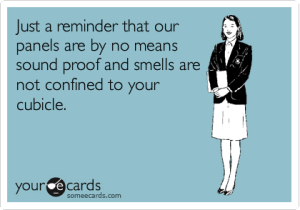Sensitivity to workplace smells and fragrances is a growing problem.
In my last post, I discussed the possibility that noise problems in the workplace may become the new mold, in the sense that those of us who design, build, manage, and maintain indoor spaces may have to deal with complex noise issues.
Next up, workplace smells and fragrances. Many may laugh at the idea that workplace smells or fragrances can be a headache (no pun intended), but I’ve seen it firsthand, both personally and professionally. There’s an increase in the number of complaints due to sensitivity to workplace smells.
First, a quick story: when I was 13 I took a trip to Arkansas with a friend’s family. It was a great trip, driving the whole time through the hills and valleys (to me, they seemed like mountains!) in a brand new Pontiac. What wasn’t so great was the bit of motion sickness that was exacerbated by the new car smell. And those memories have stayed with me – whenever I smell “new car smell”, I get a little queasy, and sometimes develop a headache.
“What’s wrong with you? EVERYONE loves new car smell!” – I’ve heard that when telling people I’m not a big new car smell fan. But for others, that odor is a source of joy – pride even, because it represents a new set of wheels. And to be clear, I have nothing against cars, especially new cars. But that smell sets me off.
And we’ve since learned that the wonderful new car smell isn’t so great – the smell is off gassing adhesives and other materials from the car’s manufacturing process. And some of those off gassing chemicals aren’t so good for us. But since many people love that smell, they can endure the exposure (or at least seem to) with great pleasure. I mean, who doesn’t get at least a little excited when driving a new car?
On to our indoor environments – offices, classrooms, meeting spaces. Are adverse effects from workplace smells and fragrances (or odors or whatever you call them) a big deal?
Indoor environmental factors affect most people differently. That’s why some people don’t mind co-worker’s cologne or perfume, while a small percentage may experience problems related to the fragrance. And these problems range from discomfort, uneasiness, nausea, headache, and asthma like symptoms to serious side effects.
So from the standpoint of seriousness, aren’t absenteeism and loss of productivity an issue for all of us? I’m guessing yes, even if we don’t actively measure their effects on our workplaces.

workplace smells are a common complaint, especially in crowded areas.
Other irritating items include:
-
scented candles/plugin air fresheners
-
scorched microwave popcorn (I had to add that because it is REALLY annoying)
-
cleaning chemicals
-
deodorizers (maybe in use to mask a more serious problem – that’s a separate article by itself)
-
soaps and shampoos
-
scented magazine advertising inserts
-
workplace electronics (some give off ozone!!!)
-
off gassing furniture or construction materials
If you’re still with me, you may be thinking there’s nothing to this, or you’ve lived this yourself, either as a person who’s endured these problems, or you’ve had to solve these problems.
So what do we do? It’s probably not a good idea to ban all soaps and deodorants – after all, people produce odors, and some of those are not so enjoyable. And all construction materials and furnishings have a smell. So being completely fragrance free isn’t realistic. There doesn’t seem to be a universal response to these indoor environmental problems, except for one:
Don’t dismiss complaints out of hand – the people reporting these problems want to understand that you’re listening to them and taking the problem seriously. They may be giving you an important insight into a more serious problem with the building, and most of the time want to help. In my experience, very few complaining individuals are trouble makers who want to get some sort of disability payment (but there are some!).
Communicate, and Investigate. Talk to your people, hear their stories, and ask for their help. And work on finding the source of the problem and determine corrective action options.
Some business and building owners have been sued under the Americans With Disabilities Act (ADA) because of these problems. My attorney readers out there probably have varied opinions regarding whether or not ADA claims are warranted for this. But if you’re sued and have all the time and expenses tied up (and you eventually win), what did you gain? So I recommend keeping an eye out for these problems.
The Job Accommodation Network (JAN) article on this topic (see below for link) has some interesting recommendations for dealing with these issues:
-
Maintain good indoor air quality (absolutely!!!!)
-
Discontinue the use of fragranced products
-
Use only unscented cleaning products
-
Provide scent-free meeting rooms and restrooms (maybe we should call this “reduced fragrance” or something like that)
-
Modify workstation location
-
Modify the work schedule
-
Allow for fresh air breaks
-
Provide an air purification system
-
Modify communication methods
-
Modify or create a fragrance-free workplace policy
-
Telecommuting
Here are some interesting articles with more on this topic:
If you’ve had these problems, what did you do? I’d like to get your feedback so I can share it with others (I always leave out identities and specific details).
If you’d like more information or help on how to solve your organization’s Indoor Air Quality (IAQ), or improve your workplace IAQ, please call or
email me.
Stay odiferous (but not unpleasantly so!), my friends.

